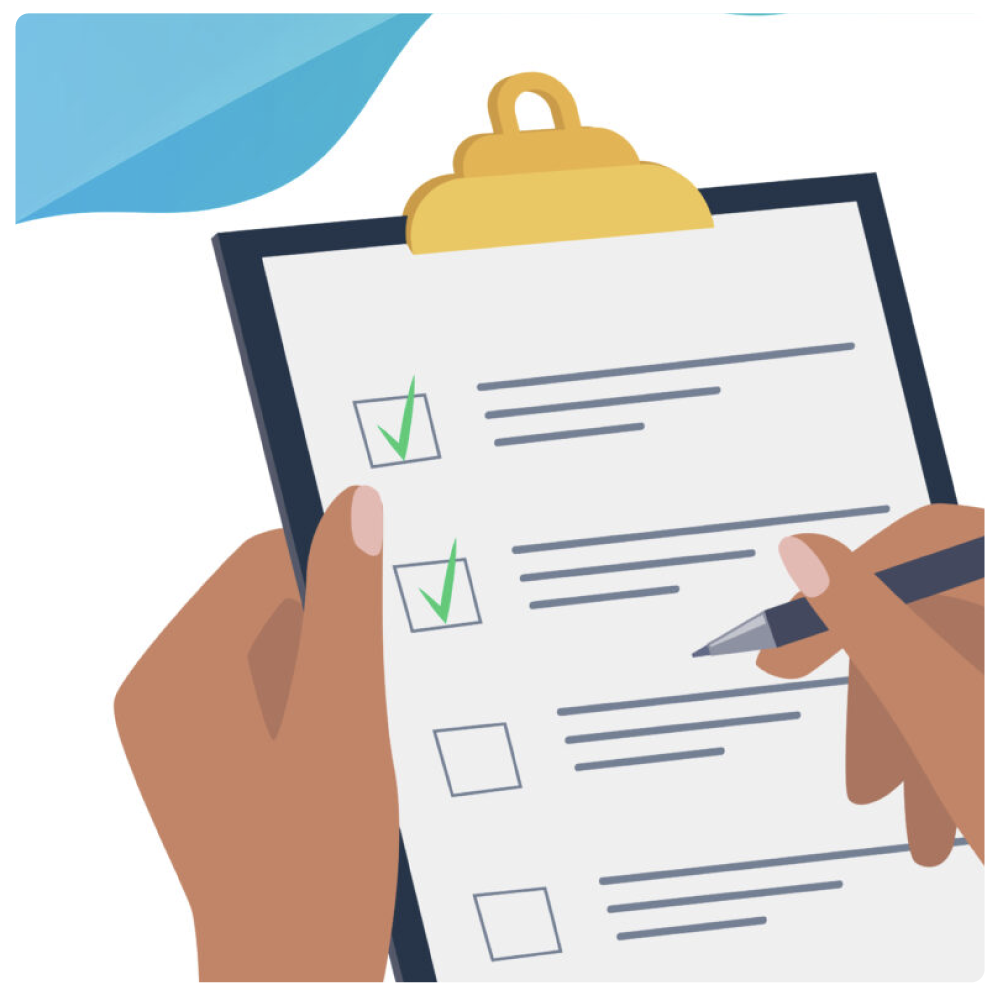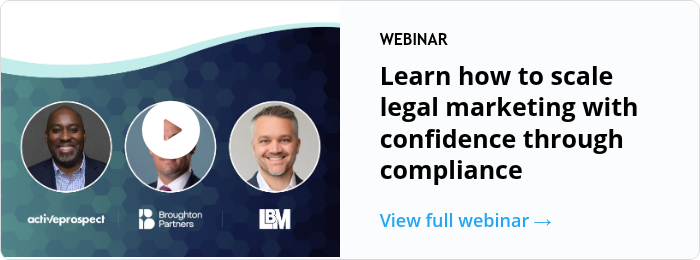Safe, scalable, and smart: How legal marketers can win with compliance

The legal marketing landscape is rapidly evolving—bringing with it new challenges, regulations, and opportunities.
In our webinar, “Scaling legal marketing with confidence through compliance,” industry experts Earl McCarthy (Sales Director at ActiveProspect), Cason Carter (CEO at Broughton Partners), and Andy Northcutt (VP of Business Development at Legal Brand Marketing) tackled the growing complexities of digital marketing for law firms, emphasizing the critical role of compliance.
Key takeaways
Here’s a breakdown of the most impactful takeaways from the session:
- Compliance is your growth foundation: TCPA violations are costly, but compliance isn’t just about protection—it’s a strategic, competitive advantage.
- Measure everything: Without clear attribution, you’re flying blind. Tracking is essential to both compliance and performance.
- TrustedForm is a must-have: Documented proof of TCPA consent helps protect you from junk leads, TCPA trolls, and class-action lawsuits.
- Vet your vendors: Insist on compliance-first practices—like express consent, indemnification, and regular audits—to help protect your law firm.
- Bad actors are growing smarter: Fraudulent claimants and spoofed leads can severely impact your budget and harm your firm’s reputation.
- AI is powerful—but risky: Chatbots and automation can significantly enhance efficiency in your legal marketing efforts, but they must be reviewed through a compliance lens just like any human marketing.
- Safe Harbor requires records: Document everything—opt-ins, call suppressions, lead source—and confidently position yourself to be fully audit-ready.
- NLVA can help vet lead sources: Legal marketers can leverage associations like the National Legal Vendors Association to conduct thorough due diligence on vendors and technology service providers.
Let’s take a closer look at the topics presented above.
Challenges in legal lead generation
A poll during the webinar revealed that the top challenges for law firms in web-based lead gen include:
- Driving qualified traffic (38%)
- Regulatory compliance (33%)
- Converting traffic into leads (25%)
Andy attributed traffic challenges partly to strict advertising rules enforced by state bars, which limit what law firms can say in ads. On top of that, marketers must account for increasingly short attention spans and the need to be omnichannel.
Cason stressed the importance of thinking strategically about where target audiences spend their time online and measuring every campaign touchpoint. “You can’t manage what you can’t measure,” he stated.
Compliance: The backbone of sustainable growth
The webinar dug deeply into TCPA compliance—particularly how it intersects with legal advertising ethics.
Follow the bar first
Cason emphasized a guiding principle: Start by adhering to state bar advertising ethics, then apply TCPA rules on top. Often, complying with bar standards naturally covers many TCPA bases.
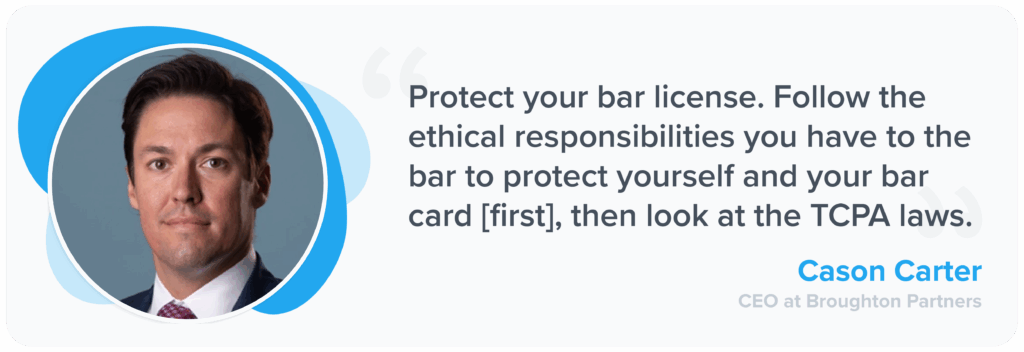
State-by-state variation
Andy noted that TCPA compliance is no longer just a federal matter. Recent cases, such as McLaughlin Chiropractic v. McKesson, have empowered states to interpret and enforce TCPA independently. That means law firms expanding across state lines must be vigilant about local regulations.
Cason shared a practical tip for navigating calling hour restrictions: Start by following the state with the most restrictive calling times. This conservative approach ensures you’re compliant across all jurisdictions. Once you’re set up within the strictest guidelines, you can gradually adjust as needed. It’s an efficient way to tackle compliance challenges without risking violations.
TrustedForm and Safe Harbor
Both speakers emphasized the importance of using tools like ActiveProspect’s TrustedForm to document consent to maintain compliance. Cason called TrustedForm “one of the most proven ways to fight for Safe Harbor” protections, which can shield businesses from liability if they can demonstrate robust compliance processes.
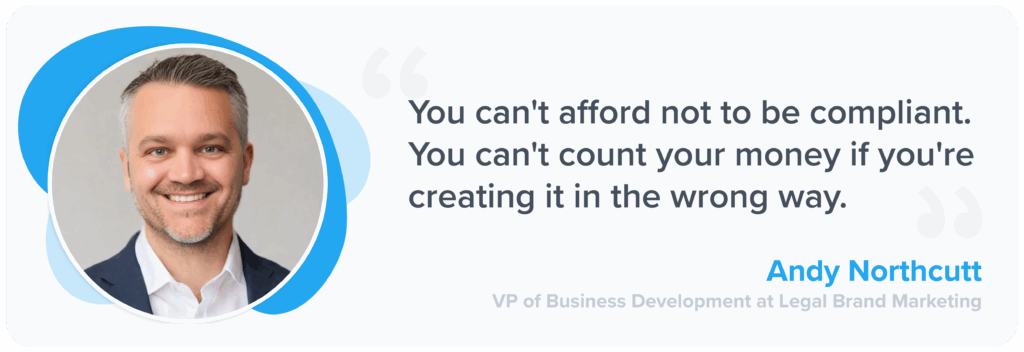
What works in legal marketing today?
When asked about the most effective lead sources in attorney marketing, panelists pointed to Meta (Facebook and Instagram) as a high-performing channel—but only when strategically applied. They also stressed that older methods like TV and print are still useful, depending on the target demographic.
Be creative, but measurable
Creativity is key—but only if you’re tracking results. Cason emphasized the value of having attribution tools in place to track performance across channels.
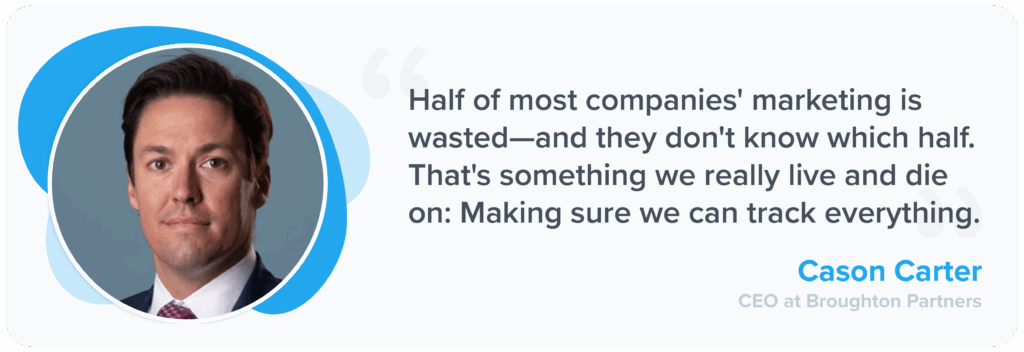
Evaluating lead vendors: Protect your firm
Working with third-party vendors introduces risks. Both speakers urged law firms to establish clear standards and contracts.
Cason recommended only working with vendors that:
- Use TrustedForm for every lead
- Follow strict disclaimer language
- Provide full indemnification
- Agree to penalties for violations
Andy added that even small inconsistencies in a vendor’s process (like failing to register as a referral service in Florida) can introduce major risks. He advised easing into relationships with month-to-month contracts and requiring API access to case management systems for visibility.
For those looking to vet vendors more thoroughly, Cason recommended checking out the National Legal Vendors Association (NLVA), which screens vendors and provides resources for legal marketers.
Protecting against bad actors and TCPA trolls
The threat of TCPA litigation continues to rise—especially from opportunists known as “TCPA trolls” who intentionally bait marketers to trigger violations.
These individuals often use AI tools to generate formal-sounding demand letters and aim for quick settlements under $5,000. Earl warned that paying these demands can encourage more attacks.
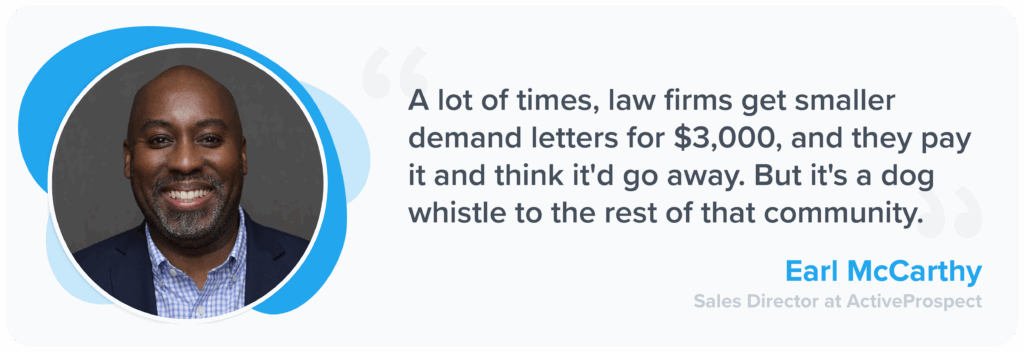
Cason advises law firms to fight every single demand letter—even if the claim seems minor—if they did nothing wrong. He warns that giving in can signal vulnerability to a growing underground community that shares intel, potentially triggering a flood of additional demands.
AI and chatbots: Use with caution
AI tools like chatbots can streamline intake and increase engagement, but they come with compliance risks. Andy stressed that AI-generated messaging must follow the same ethical and TCPA rules as human interactions.
For example, a chatbot that collects a phone number must still capture express written consent before any outbound contact. And it must avoid language that makes promises or violates bar guidelines.
The compliance checklist: 5 must-follow best practices
To wrap up, the panel outlined five essential best practices to reduce TCPA risk:
1. Obtain clear and documented consent
Use unambiguous language, specify who will contact the user, and get express written consent for texts, calls, and pre-recorded messages.
2. Keep meticulous records
Maintain organized logs of opt-ins, call history, timestamps, and lead source details. ActiveProspect’s TrustedForm simplifies this.
3. Scrub against all DNC lists and the RND
Check every contact list against national, state, and internal Do Not Call (DNC) lists and the Reassigned Numbers Database.
4. Train your team regularly
Include TCPA guidelines in onboarding, hold recurring training sessions, and ensure marketers understand compliance requirements.
5. Use TrustedForm
Don’t rely solely on vendors. Collect and store consent records yourself. TrustedForm is a low-cost, high-impact safeguard.
Final thoughts: Compliance is a growth strategy
Legal marketers today face unprecedented opportunities to scale through digital platforms—but also greater risks. From social channels to AI bots to state-by-state TCPA interpretations, the landscape is complex and constantly shifting.
As the panelists made clear, the only sustainable path forward is compliance. It’s not just a risk mitigation tactic—it’s a competitive advantage.
To learn more about how ActiveProspect can help your firm scale with confidence, schedule a free demo now!
DISCLAIMER: This page and all related links are provided for general informational and educational purposes only and are not legal advice. ActiveProspect does not warrant or guarantee this information will provide you with legal protection or compliance. Please consult with your legal counsel for legal and compliance advice. You are responsible for using any ActiveProspect Services in a legally compliant manner pursuant to ActiveProspect’s Terms of Service. Any quotes contained herein belong to the person(s) quoted and do not necessarily represent the views and/or opinions of ActiveProspect.




